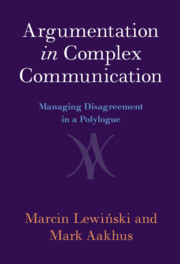Book contents
- Argumentation in Complex Communication
- Argumentation in Complex Communication
- Copyright page
- Contents
- Figures
- Preface
- Part I Seeking, Seeing, and Embracing Polylogue
- Chapter 1 Seeking Polylogue
- Chapter 2 The Dyadic Reduction
- Chapter 3 Seeing Polylogue
- Chapter 4 Embracing Polylogue
- Part II Analyzing, Evaluating, and Designing Polylogue
- References
- Index
Chapter 3 - Seeing Polylogue
from Part I - Seeking, Seeing, and Embracing Polylogue
Published online by Cambridge University Press: 22 February 2023
- Argumentation in Complex Communication
- Argumentation in Complex Communication
- Copyright page
- Contents
- Figures
- Preface
- Part I Seeking, Seeing, and Embracing Polylogue
- Chapter 1 Seeking Polylogue
- Chapter 2 The Dyadic Reduction
- Chapter 3 Seeing Polylogue
- Chapter 4 Embracing Polylogue
- Part II Analyzing, Evaluating, and Designing Polylogue
- References
- Index
Summary
This chapter develops the crucial starting points for an inquiry into argumentation as polylogue. A framework is advanced that foregrounds polylogue as the natural state of affairs for argumentation. The framework elaborates how argument is embedded in communication and communication in activity, how argumentation is for communication, and how argumentation is a source of communicative innovation for polylogue. This profoundly social view of argumentation grounds the idea that polylogues are disagreement management practices in which various players pursue their contrasting positions across multiple places. A polylogue framework offers a new social ontology of argument in complex communication that fundamentally shifts descriptive, normative, and prescriptive attention to how contexts for argumentation are made via interaction and how argument is implicated in broader chains of social action and cognition. The polylogue framework thus scaffolds the discovery, analysis, and design of argumentative structures and functions for a much wider range of discourses, messages, interactions, technologies, and institutions.
Keywords
- Type
- Chapter
- Information
- Argumentation in Complex CommunicationManaging Disagreement in a Polylogue, pp. 58 - 88Publisher: Cambridge University PressPrint publication year: 2022

